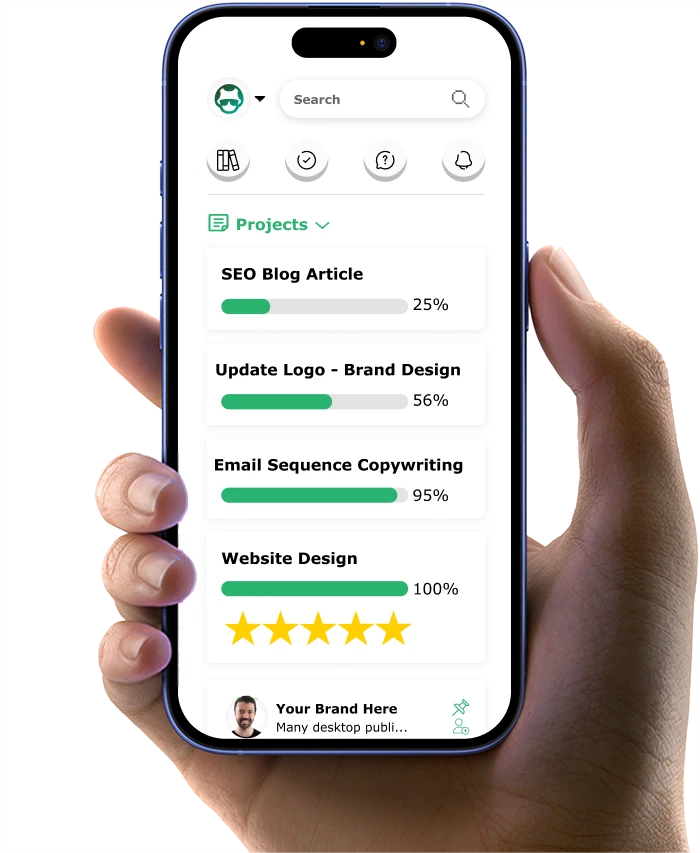11 Best Practices for Using LinkedIn to Generate B2B Sales

So you have the ideal B2B buyer persona in mind.
Now you need to somehow find this individual.
But where do you go?
Twitter?
Cold calls?
Email?
Well, those are a few options.
But what if you just use LinkedIn?
According to its website, there are 774+ million users on the professional networking platform.
And 57+ million registered companies.
That’s an enormous pool of prospecting talent—and many of these users are looking for people like you to solve their business problems.
If you want any success with LinkedIn social selling, you’ll want to read this resource.
Some of the best social selling practices when using LinkedIn for B2B sales are:
- Building a social network of potential customers—and raising awareness of your thought leadership
- Zeroing in on the exact target audience that your company seeks to sell to
- Taking advantage of premium features that open the door to untapped potential
Before we begin, let’s first define what social selling is.
Want to delegate all your marketing and funnel work done—without the headaches of hiring? Download our free guide: 33 Marketing Projects You Can Delegate to Growbo and discover how to save 100+ hours a month, grow faster, and scale without the overhead.
What Is Social Selling?
Social selling can be defined as the process of developing and nurturing relationships with prospects on social media platforms.
The two most popular platforms used for social selling are LinkedIn and Twitter.
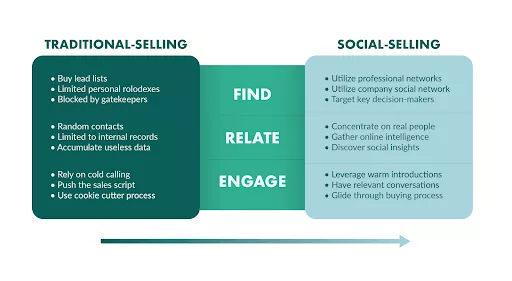
As stated by LinkedIn Sales Solutions, 50% of B2B buyers go to LinkedIn for purchasing decisions.
With LinkedIn social selling, you can interact with prospects through private messaging, sharing content, liking posts, and writing comments.
Social selling is more personal than cold calling.
According to a Harvard Business Review, 90% of B2B buyers won’t respond to cold calls.
And LinkedIn says 78% of social sellers outsell peers that don’t use social media.
Now that you’ve got some background on what social selling is and why you should use LinkedIn to reach prospects, let’s start with the first LinkedIn for B2B sales best practices.
#1 Best Practice for B2B Sales on LinkedIn: Ask for Your Past Clients to Introduce You to Their Connections
According to Think Impact, referrals influence the buying decision of 91% of B2B decision makers.
And 71% of sales personnel find that referrals generate more conversions than other efforts.
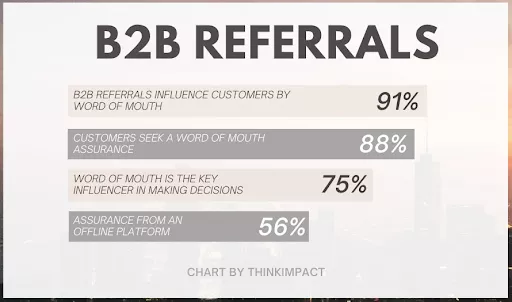
When using LinkedIn for B2B sales, see who your past clients are connected to.
Then, try to identify profiles of professionals within the same industry that could use your services.
And before connecting with a new prospect, reach out to those past clients to ask them if they’d introduce you to him or her.

If your company has a referral program, then make sure you let your past client know about it.
By having someone introduce you to a prospect, you’re going to seem more credible compared to your competitor who just uses cold calling.
You see, 87% of B2B buyers have a favorable opinion of a salesperson who’s introduced to them through a shared network, as per LinkedIn.
#2 Best Practice for B2B Sales on LinkedIn: Have an Outstanding Profile That’s Professional and Relevant
As you all know, first impressions are extremely important when it comes to B2B sales.
In fact, Forbes says that you have roughly 7 seconds to make a good first impression.
And one way prospects will judge you is your profile.
Do you have a professional-looking profile pic?
Does your headline clearly convey your value proposition? (Make sure you use the right keywords.)
How about your summary and media? How would you respond to someone with your profile?
As an example, take a look at the profile below of a sales manager.
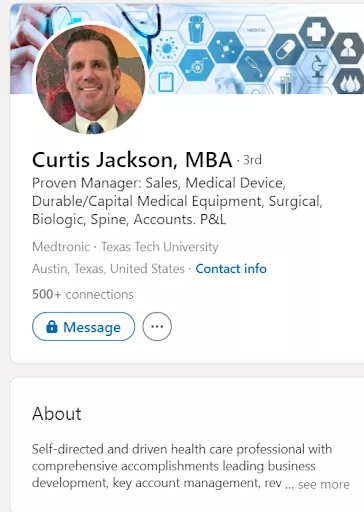
Besides the professional profile pic with a clean background, the headline is hyper targeted.
As opposed to saying something generic like, “Sales manager with great leadership skills for 17 years,” Curtis Jackson’s headline is tailor-made for the medical community.
So when he reaches out to prospects on LinkedIn, they’ll see him as an expert in their field.
#3 Best Practice for B2B Sales on LinkedIn: Post Regular Content
B2B buyers are more skeptical than your average consumer.
So they require a little more evidence from you.
If you’re using LinkedIn for new sales, it’s not going to happen right away.
Instead, you need to nurture them.
And posting content is one way to win them over.
According to Marx Communications, 80% of B2B buyers prefer to get company information through articles as opposed to ads.
As a salesperson, this means you should be keeping up to date with your company’s blog—and sharing content with other LinkedIn users (either through private messages or your own feed).
In time, more prospects will start following you.
Even though you might be in sales, it doesn’t mean you couldn’t start doing your own blogging through LinkedIn’s in-house publishing platform, Pulse.
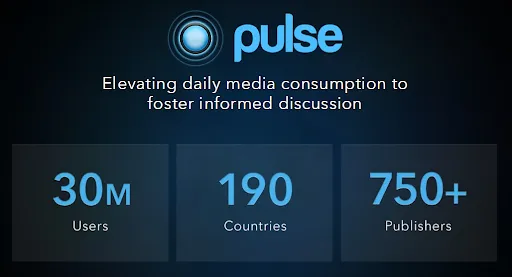

#4 Best Practice for B2B Sales on LinkedIn: Share Case Studies with Prospects
Your prospects on LinkedIn face a problem. And they seek a solution, right?
Well, case studies demonstrate how your company has solved that problem in the past for another client—building credibility in the eyes of your prospect.
And according to a Demand Gen Report, 73% of B2B buyers seek a case study during their research process.
If you’re in a private chat with the prospect, then make sure the case study is targeted for him or her.
For example, if they’re in the hospitality industry, don’t send a case study on how your company helped a grocery chain.
#5 Best Practice for B2B Sales on LinkedIn: Utilize Social Selling Index
If you pay for LinkedIn Sales Navigator, you gain access to an integration called Social Selling Index (SSI).
Simply, it compares your social selling capabilities with your competitors.
The feature works for both individual and business accounts.
On average, sales reps using SSI are 51% more likely to hit their quotas when using SSI, according to LinkedIn.
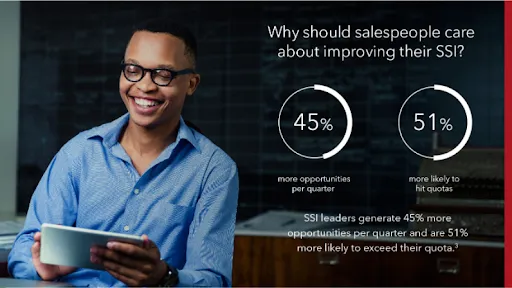
You might be wondering, “Is there any proof that SSI works?”
And the answer is yes.
As one example, commercial real estate consultant, JLL, had a team of salespeople that struggled to reach out to the right people. So they turned to SSI for LinkedIn.
SSI allowed JLL’s salespeople to be 57% more effective at reaching out to the right decision makers.
Not only that, employees of JLL cut down on the sales cycle time and outperformed competitors by 60%.
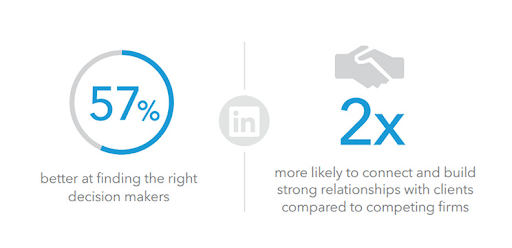
#6 Best Practice for B2B Sales on LinkedIn Join Groups
In the past,we’ve talked about how to use Facebook groups to get more coaching leads.
And with LinkedIn groups, it’s the same idea—but you just apply a B2B sales lens instead of coaching.
By joining LinkedIn groups, you narrow down the audience you want to engage with.
Instead of sharing a post with absolutely anyone on LinkedIn, you’ll share it with like-minded individuals.
That way, you get more engaged eyes on your content.
Below is an example of some groups that pop up when you search for “social media and Dallas.”
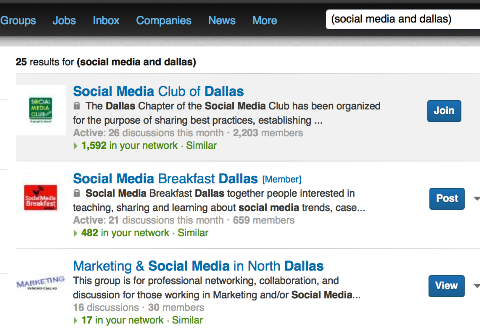
Groups can also be used to establish rapport with prospects.
For example, answering a question shows others that you’re a thought leader in the industry.
From there, you might get other users to carry on the conversation with you. Or even start following you.
At the end of the day, LinkedIn is a networking platform. And joining groups lets you meet a lot of new people (some of them may end up being new clients).
Lastly, groups can be used as a social listening tool.
You can see what kind of pain points your target audience have, what kind of topics they enjoy, and formulate different selling tactics.
After learning more about your prospects, you can design new scripts that would be highly personalized for them.
#7 Best Practice for B2B Sales on LinkedIn : Send InMail Messages
If you’re serious about using LinkedIn for sales, then signing up for premium is a must!
And with a premium account, you gain access to InMail.
With InMail, you can message anyone on LinkedIn, regardless of connection status.
Often used by recruiters, InMail can also be used by salespeople.
According to LinkedIn, the InMail message response rate is between 10 and 25%.
That’s a 300% higher rate than the old, trusty email.

Some things to keep in mind with InMail messaging:
- Keep messages on the shorter side (between 200-400 words)
- Make it personalized (messages without a template perform 20% better)
- Avoid sending messages on Saturdays

#8 Best Practice for B2B Sales on LinkedIn: Be Ready to Respond at a Moment’s Notice
Consumers today are really picky.
But who could blame them?
They have so many options to choose from.
And as a result, they expect you to reach out to them with queries at lightning speed.
B2B buyers, in particular, are incredibly finicky.
In a survey carried out by Salesforce, it was found that 80% of buyers expect a seller to respond to them in real time.
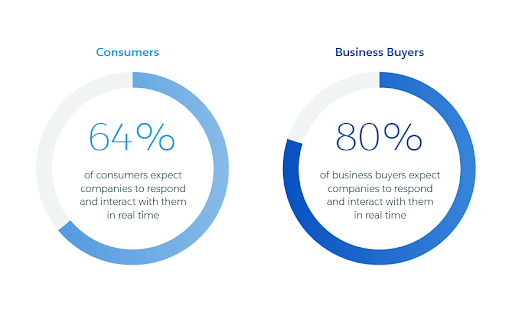
To avoid inconveniencing or upsetting a B2B prospect, always make sure your phone’s battery is charged and you have notifications turned on.
Being bombarded with notifications on your phone is a pain.
And it’s tempting to just turn notifications off altogether.
But doing so risks the possibility of losing a new sale.
You see, your prospect could very well take it personally when it takes you 5 hours to respond to him or her.
In addition to your phone notifications, you can set up sound notifications on your other versions of LinkedIn.
While working on your PC, laptop, or other device, you’ll hear the sound notification when your prospect messages you.
And you won’t miss out on your opportunity in case your phone unexpectedly dies or you miss the notification.
Then there’s the issue of time zone differences.
For this, it will require you to keep tabs of your LinkedIn during non-working hours.
Remember, your prospect is the focus and expects to be treated accordingly.
#9 Best Practice for B2B Sales on LinkedIn: Take Advantage of Lead Generation
When you have LinkedIn Sales Navigator, you have access to a lead-generating juggernaut.
And one of the most useful features is Lead Generation, where you can use advanced filtering options to narrow down who you approach.
You can segment your audience by a wide range of data.
Some of the filtering options include the following:
For Companies For People
- Company size
- Industry
- Company revenue
- Department size
- Group membership
- School attended
- Job title
- Seniority level
After doing advanced searches, you can create Lists—which are essentially your segments.
Then, you can easily send personalized messages to your new prospects.
For example, you might want to send a different message to a CEO of a small marketing agency than the regional manager of a manufacturing plant..
According to HubSpot, 40% of salespeople say prospecting is the most difficult stage of the sales process.
But Lead Generation simplifies it for you.
Not only will Lead Generation save you time, it’ll allow you to discover entirely new prospects that you otherwise wouldn’t be aware of.
#10 Best Practice for B2B Sales on LinkedIn: Contact Multiple Decision Makers
Using LinkedIn for B2B sales will not be a quick process.
According to sales software firm Spotio, your company will need to deal with 7 decision makers before closing a sale.
So reaching out to just one prospect isn’t the most effective way to sell your product or service.
When you’ve identified a company that seems promising, do a little research.
And see how the hierarchy is structured.
If one person ignores you, move on to the next.
Being aggressive has its advantages in social selling.
You’re 69% more likely to hit your quota when you contact at least 10 people from an organization, as per LinkedIn Sales Solutions.
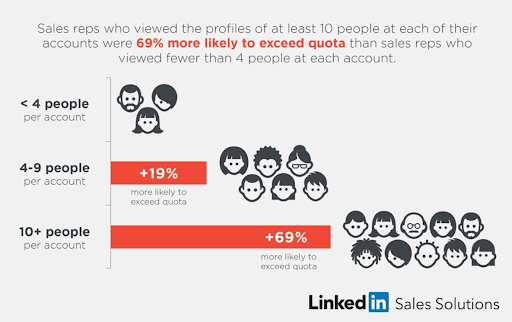
#11 Best Practice for B2B Sales on LinkedIn: Sell to Your Existing Customers
It’s no secret that selling to your existing customers has its payoffs.
One study even found that increasing customer retention by just 5% can increase profits by 25-95%.
Clearly, you should be dedicating a good chunk of time trying to cross-sell and upsell to your existing customers on LinkedIn.
And you don’t want to be annoying, obviously. Like messaging someone two days after closing a sale.
I’m talking about creating a customer roadmap—taking note of when the company reaches a certain milestone, when a subscription is about to expire, when a replenishment will be needed, and other triggered events.
Now, I’m sure that your company uses email automation that is already scheduled to reach out to B2B customers for these events—but it doesn’t hurt for you to add a human touch via LinkedIn.
For example, say that your customer has reached the max amount of employees allowed to use your productized service.
Reach out to the decision makers on LinkedIn. And ask them how they’re enjoying the product.
This is a good time to remind them of your higher-tiered plans that have less restrictions.
In turn, it’ll be easier to generate more profitability from your customers.
To be more precise, selling to existing customers is 40-65% easier than selling to new ones, according to Marketing Metrics.
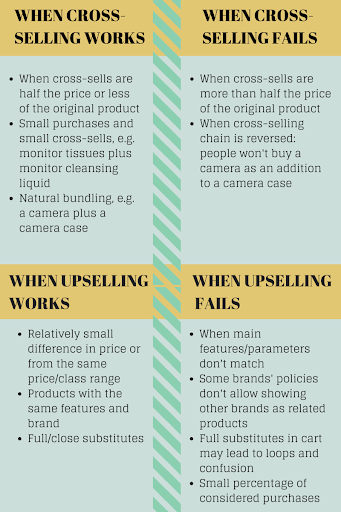
Conclusion
Want to delegate all your marketing and funnel work done—without the headaches of hiring? Download our free guide: 33 Marketing Projects You Can Delegate to Growbo and discover how to save 100+ hours a month, grow faster, and scale without the overhead.
Trying to acquire new B2B clients is a gradual process.
It takes thick skin and resilience.
It usually takes multiple follow-ups to eventually get a “yes.”
And even then, your prospects will usually flake.
But this resource will increase your odds by providing you with 11 best practices for B2B sales on LinkedIn that you can use to win over new B2B buyers.
With these strategies, you’ll be better equipped to target the right prospects.
And you’ll be in a position to establish a meaningful connection that’ll allow you to resonate with them.
In the event that your company needs to ramp up its social selling strategy, reach out to one of our consultants.
We have teams of digital commerce experts that will identify and segment your target audience.
And we’ll come up with a messaging that wins over new B2B clients.
Thanks for reading the article.
Was anything in this resource helpful to you?
Let me know in the comments below.
Keep Growin’, stay focused.
Mark

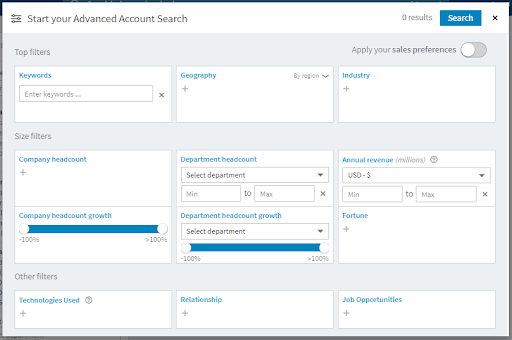 Source
Source
